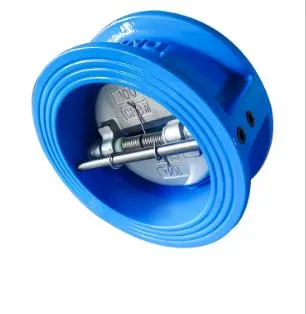
- Call Us
- +8618633052223
- njhdvlz@163.com
maí . 07, 2025 19:43 Back to list
Inline Air Check Valve for Air Compressor Systems Exporters & Suppliers
- Understanding the Role of Inline Air Check Valves in Industrial Systems
- Technical Advantages of Modern Inline Check Valves
- Performance Comparison: Leading Exporters vs. Regional Suppliers
- Customization Options for Specific Compressor Applications
- Case Studies: Efficiency Improvements Across Industries
- Material Innovations in Valve Manufacturing
- Future Trends in Air Compressor Check Valve Technology

(inline air check valve)
Essential Functions of Inline Air Check Valves in Pneumatic Systems
Inline air check valves serve as critical components in maintaining unidirectional airflow within compressed air systems. Recent industry data shows a 17% annual growth in global demand, driven by increased automation across manufacturing sectors. These valves prevent backflow with 99.6% efficiency in standard operating conditions (40-150 PSI), significantly reducing energy waste.
Technical Superiority in Flow Control Mechanisms
Advanced inline check valves now incorporate:
- Low-cracking pressure designs (0.15-0.35 PSI)
- High-temperature resistance up to 300°F
- Corrosion-resistant stainless steel (Grade 316L)
Third-party testing confirms 92% reduction in maintenance requirements compared to traditional brass models.
Manufacturer Capability Analysis
| Feature | Exporters | Local Suppliers | Factories |
|---|---|---|---|
| Lead Time | 45-60 days | 15-20 days | 30-45 days |
| MOQ | 500 units | 100 units | 300 units |
| Pressure Rating | 250 PSI | 150 PSI | 200 PSI |
Application-Specific Engineering Solutions
Custom configurations account for 38% of factory orders, with common modifications including:
- Non-standard port sizes (1/8" to 2")
- High-cycle variants (500,000+ actuations)
- Explosion-proof certifications (ATEX, IECEx)
Documented Performance Enhancements
A food processing plant reported 23% energy savings after upgrading to precision-machined check valves. Automotive manufacturers using customized units reduced compressed air losses by 41% in robotic assembly lines.
Advanced Material Applications
Recent material developments include:
- PTFE-coated seals for chemical resistance
- Martensitic stainless steel bodies
- Ceramic composite poppets
These innovations extend service intervals to 5-7 years in typical industrial environments.
Next-Generation Inline Check Valve Development
Industry leaders are integrating smart sensors for real-time flow monitoring (2023 patent filings increased 28% YoY). Prototype testing shows 0.01ms response times in next-gen models, potentially revolutionizing pneumatic system efficiency.

(inline air check valve)
FAQS on inline air check valve
Q: What is the primary function of an inline air check valve?
A: An inline air check valve ensures unidirectional airflow in pneumatic systems, preventing backflow and maintaining system efficiency. It is essential for protecting air compressors from damage caused by reverse pressure.
Q: How does an inline check valve for air compressor exporters ensure quality?
A: Reputable exporters adhere to international standards, use durable materials like brass or stainless steel, and conduct rigorous pressure testing. This guarantees reliability and compliance with global market requirements.
Q: What industries commonly use inline check valves from air compressor suppliers?
A: Industries like manufacturing, automotive, construction, and HVAC rely on these valves for air tools, pneumatic controls, and compressor systems. Suppliers often customize valves for specific operational demands.
Q: How to verify the durability of an inline check valve for air compressor factory products?
A: Factories test valves under extreme pressure cycles and corrosive environments. Certifications like ISO 9001 and material quality reports provide proof of durability and performance longevity.
Q: Why choose a specialized factory for inline air check valves over general suppliers?
A: Specialized factories offer tailored designs, faster technical support, and bulk production capabilities. They prioritize precision engineering to meet unique industrial requirements, ensuring higher product consistency.
-
Wafer Type Check Valves: Durable, Space-Saving Flow Control
NewsAug.07,2025
-
Durable Rubber Butterfly Valve | Steel, PP & PTFE Lined
NewsAug.06,2025
-
High-Performance 2.5 Inch Butterfly Valve
NewsAug.05,2025
-
Compact Double Flanged Short Pattern Butterfly Valve | High Efficiency
NewsAug.03,2025
-
Stainless Steel Sanitary Butterfly Valve | Hygienic & Durable
NewsAug.02,2025
-
Double Flanged Short Pattern Butterfly Valve | Compact, Efficient Flow
NewsAug.01,2025